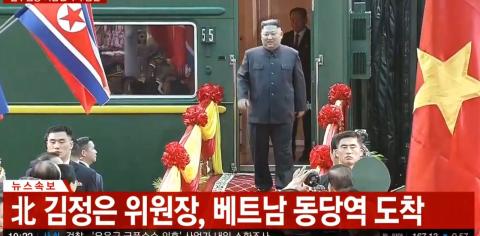How to capture a year of extraordinary diplomacy on the Korean peninsula, that started out with bragging about the size of a nuclear button to a cozy photo-op with the US President and North Korea’s supreme leader. Perhaps Khang Vu put it best, asking whether the so-called “Olympic truce” struck when South Korea hosted the Winter Games in February could last.
Its significance depends much on Pyongyang’s sincerity.
And for all the summits and circus that followed across the year, that same question, what Kim Jong-un means to achieve, has never been far away. Robert Kelly:
In the last six months, US President Donald Trump has ‘fallen in love’ with North Korean leader Kim Jong-un. He has also been persuaded that Kim respects him, likely because he called him ‘your excellency’ in his ‘beautiful letters’. South Korean President Moon Jae-in has claimed Trump is the ‘only one who can fix the Korean peninsula’. He and his Foreign Minister, Kang Kyung-wha, also suggested that Trump win a Nobel Prize for bringing peace to Korea. Good grief.
The June Singapore summit between Trump and Kim was certainly historic, even if the actual results are still unclear. Daniel Flitton:
As a moment in time, I’d sooner see a clown president and chubby-cheeked despot, both with nuclear arsenals, shake hands, sit down, and talk in person than fire rhetorical salvos across the airways, or something far worse.
But Danielle Chubb and Andrew Yeo worried at something obvious missing from the talks.
No true security on the Korean Peninsula can be achieved without resolution of the human rights issue … and it is unsettling to see a tyrant such as Kim Jong-un feted on the world stage and treated as a legitimate ruler. However, it is also unclear whether raising human rights issues directly in the context of a security dialogue will have any beneficial outcomes for the people inside North Korea.
Meghan Fitzpatrick examined the deal to return the remains of US soldiers killed in the Korean War.
The Korean War was the first time that the military systematically recovered and returned deceased servicemen home. From 1950 to 1953, US Graves Registration teams sent recovered remains to a team of forensic anthropologists and specialists based in nearby Japan for identification. But it proved impossible to locate all of those killed in action. During the early phases of the war, fighting was highly mobile and the front line fluctuated up and down the Korean Peninsula. As a result, combat units frequently had to leave the bodies of comrades behind in shallow and poorly marked graves. Nearly 3000 Americans also died behind enemy lines as prisoners of war.
Elise Thomas reported on the Pyongyang’s cyber shenanigans and evidence of double-dealing.
The more economically isolated North Korea becomes, the more dependent it is on criminal sources of revenue. The bulk of North Korea’s cybercrime takes place at a low level, such as online gaming scams. However, growing financial pressure as a result of sanctions has also been met with increasingly determined, sophisticated and audacious attacks on banks and financial institutions around the world.
And despite talk of another Trump-Kim summit, Khang Vu thought just one was enough.
It is instead time for the US to recognise North Korea as a de facto nuclear power and engage in only ministerial-level dialogues, to avoid giving Pyongyang too much global attention. The presidential-level summit so far has not persuaded Pyongyang to make verifiable and irreversible concessions, while another summit of that scale would rationalise its pursuit of the nuclear capability in the first place.

